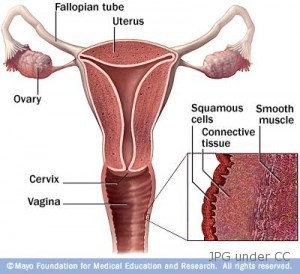Vaginal Cancer facts

OVERVIEW
Vaginal cancer is a rare gynecological type of cancer that develops in women’s malignant vaginal tissue. Some people consider this disease as similar to the vulva cancer, which is not true since the vagina of a woman is a narrow, elastic canal that extends from the cervix to the external area of the body.
Normally, cells in the vagina start to grow and divide in order to form new cells. When these cells get old and die, another set of new cells will take their place. However, when an impaired process of cell formation and division takes place, the vaginal cells will start to divide and they will grow abnormally. As a result, the old vaginal cells do not die, if they have to, a tumor or an abnormal tissue mass is formed, which leads to this disease.
This type of cancer represents 2% to 3% of all cancers in the reproductive system. More often, this becomes a secondary cancer since cancerous cells move and invade the vagina from other organs of the reproductive system, such as the vulva and the cervix. It can be treated effectively when diagnosed at an early stage.
TYPES AND FORMS
This disease is characterized into two basic types, squamous cell carcinoma and the adenocarcinoma.
1. Squamous Cell Carcinoma. It is the most common type of vaginal cancer that spreads slowly and often stays near the vagina but this time it spreads into the other parts of the body, like the lungs andf liver. This type of cancer often occurs in women at the age of 60 or older.
2. Adenocarcinoma. It is a type of cancer that starts in glandular cells. Similar to squamous cell carcinoma, this type of cancer spreads to the lymph nodes and lungs. It often occurs in women at the age of 30 or younger.
SYMPTOMS
This disease does not show clear symptoms. That is why it is also known as the silent killer as it is often discovered through smear test or cervical screening. However, common symptoms of cancer in the reproductive system can also be associated to vaginal cancer. Symptoms of this disease include a bloody discharge and vaginal bleeding during sexual intercourse, vaginal bleeding after menopause, pain during sexual intercourse, bloody urine, frequent urination, pelvic pain, unusual vaginal discharge, a mass felt, constipation, and pain in the rectum.
A woman who has had a hysterectomy has a chance of getting vaginal cancer. And since symptoms of this disease are almost similar to other medical conditions, it is best to consult a doctor for early diagnosis.
RISK FACTORS
Like most cancers, the actual cause of this disease is also unknown. But according to research, this disease is not infectious; therefore, it is not a contagious disease. Scientist made a research and identified some risk factors that can lead to this disease. Here are some of them:
- Women at the age of 30 or younger
- Women at the age of 60 and older
- Smoking
- Human Papillomavirus Infection
- HIV Infection
- Exposure to a drug known as DES (Diethylstilbestrol)
TREATMENT
Treatment for vaginal cancer is determined depending on the cancer stage. Here is the suggested treatment for the following stages:
Stage 0 (carcinoma in situ)
- Wide local excision, which is performed with or without a skin graft.
- Partial or total vaginectomy, which is performed with or without a skin graft.
- Topical chemotherapy
- Laser surgery
- Internal radiation therapy
Stage I
- Internal radiation therapy, which is performed with or without the procedure of external radiation therapy to large tumors or lymph nodes.
- Vaginectomy or Wide local excision, which requires a vaginal reconstruction. Radiation therapy may also be given after the surgery.
- Vaginectomy, hysterectomy and lymphadenectomy are performed with or without vaginal reconstruction. Radiation therapy may also be given after the surgery.
Stage II
- Combination of the internal and external radiation therapy to the vagina, which is performed with or without external radiation therapy to lymph nodes.
- Vaginectomy or pelvic exenteration, which is performed with or without radiation therapy.
Stage III and Stage IVA Vaginal Cancer.
- Treatment for these stages is similar to treatment for adenocarcinoma and squamous cell cancer. A combination of internal and external radiation therapy, which is performed with or without surgery, is also used as treatment for Stage III and IVA vaginal cancer.
Stage IVB
- Radiation therapy as palliative therapy is used to relieve symptoms of cancer and improve the patient’s quality of life. This treatment can be combined with chemotherapy.
- A clinical trial of radio sensitizers and/or chemotherapy.
